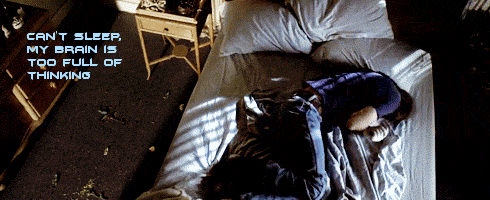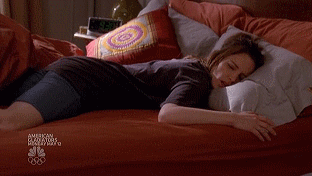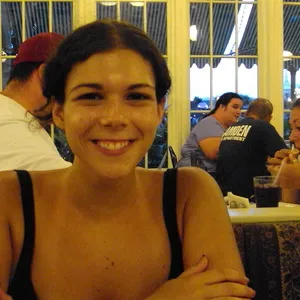You know the feeling. It’s 3 am and you want to be doing this.

Gif courtesy of giphy.com
But instead you’re doing this.

Gif courtesy of giphy.com
For me, it started around seven months ago when I found that I was up at 3 for absolutely no reason. I’m usually a night owl and, if I’m up late, it’s because I’m out with friends or just talking to my roommate and we forget what time it is. But it wasn’t like that. I was up, staring at the ceiling, and trying not to scream into a pillow in frustration. For that point on, every night was pretty much the same. I would try to sleep around 1 and, when it wouldn’t work, I’d just wait until my roommate was asleep before going into the living room and pacing until 4.
I thought of a million reasons why it was happening. It was louder outside my room now, I was eating later in the day, I wasn’t drinking enough water, whatever. So when I came home for the summer and it was still happening, I knew something was actually wrong.

Gif courtesy of giphy.com
I’ve dealt with insomnia before and I’ve been frustrated by it, but usually it’s over in a month or less. This lack of sleep was totally new to me and I couldn’t figure out why until I found out about delayed sleep phase syndrome or DSPS.
For some people, they can sleep from 11 pm to 8 am and get in the full nine hours. For the rest of us, it’s pretty common that we struggle and it’s normal to go through some times when sleep is just not happening. These struggles cross the line from a nuisance to a disorder when they interfere with day to day life and they just don’t seem to end.
DSPS causes a sleep cycle that typically starts between 1 and 4 am and ends between 8 and 11 a.m. And lucky us, college students, because DSPS typically develops in adolescence.

Gif courtesy of giphy.com
There’s a stigma that says that people who go to sleep after 1 am are night owls and partiers and that those who sleep until 11 am are just doing it because they’re lazy and not motivated to get up. But anyone who’s had to deal with waiting until sleep finally, finally embraces you knows how awful it feels to be told that they shouldn’t sleep late. Our bodies need sleep and we are desperate to get it whenever we can.
Unfortunately, life doesn’t always let us sleep late. There are few feelings worse than when your eyes close and sleep finally comes and the alarm goes off seconds later, but it does happen. Which is why DSPS so often leads to sleep deprivation and why the disorder causes 10 percent of all chronic insomnia cases.

Gif courtesy of giphy.com
In some cases, you can help your sleeping problems by attempting to adjust your circadian cycle over time. You would force yourself to wake up an hour early and crawl into bed an hour early over time in the hopes that you would set the cycle back an hour at a time. But that doesn’t work when you have DSPS. Your body will force itself to maintain the inclination to go to bed at the same time.
If you find yourself going months at a time not able to sleep before 4 am, you may be suffering from DSPS and the best thing that you can do for yourself is to talk to a doctor about it. If people tell you to just try to adjust your schedule, ignore them because all they are doing is delaying you from getting the real help you need.


